| Article ID | Journal | Published Year | Pages | File Type |
|---|---|---|---|---|
| 7241950 | Journal of Behavioral and Experimental Economics | 2018 | 19 Pages |
Abstract
Social scientists have observed that socially desirable responding (SDR) often biases unincentivized surveys. Nonetheless, media, campaigns, and markets all employ unincentivized polls to make predictions about electoral outcomes. During the 2016 presidential campaign, we conducted three list experiments to test the effect SDR has on polls of agreement with presidential candidates. We elicit a subject's agreement with either Hillary Clinton or Donald Trump using explicit questioning or an implicit elicitation that allows subjects to conceal their individual responses. We find evidence that explicit polling overstates agreement with Clinton relative to Trump. Subgroup analysis by party identification shows that SDR significantly diminishes explicit statements of agreement with the opposing party's candidate driven largely by Democrats who are significantly less likely to explicitly state agreement with Trump. We measure economic policy preferences and find no evidence that ideological agreement drives SDR. We find suggestive evidence that local voting patterns predict SDR.
Related Topics
Social Sciences and Humanities
Economics, Econometrics and Finance
Economics and Econometrics
Authors
Andy Brownback, Aaron Novotny,
